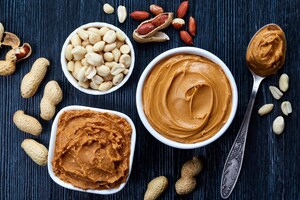
ALBANY, Ga., May 18, 2022 /PRNewswire/ -- Life today for children and adults seems to be in overdrive and that means Americans often make snack and meal decisions quickly without fully thinking about the nutritional makeup of what they're consuming.
"Being mindful about what you eat each day can have a significant impact on so many aspects of your life. Food choices can influence your mood, energy level, cognition and memory, as well as your overall health and wellbeing," says Samara Sterling, Ph.D., director of research for The Peanut Institute.
Unfortunately, most "fast food" is overly processed and relies on sugar, salt and saturated fat to make it taste good in the moment but it can end up having detrimental effects down the road and may even increase the risk for certain cancers [1].
Peanuts and peanut butter, on the other hand, are a convenient and healthy superfood choice that satisfy immediate hunger while delivering life-long benefits.
According to numerous research studies, regular consumption of peanuts has been shown to: reduce Alzheimer's disease risk by 70% [2]; reduce diabetes risk by 53% [3] and cardiovascular disease risk by 13% [4]; and aid memory, cognitive function and concentration [5]. Daily consumption can even help reduce anxiety and depression [6].
"Peanuts deliver such a plethora of benefits. A single serving of peanuts, which is about a handful, is packed with 19 vitamins and minerals and contains seven grams of plant-based protein," says Sterling.
The benefits of plant-based protein are becoming more and more apparent. Research that compared nuts and legumes to animal protein showed higher intake from meat was associated with increased mortality risk [7]. Another study found that replacing animal-based protein with plant-based protein can substantially lower the likelihood of developing diabetes [8]. Finally, an interesting study of older adults found that faster walking speed was associated with a higher intake of plant protein, while slower walking speed was associated with greater animal protein intake [9].
In addition to their nutritional benefits, peanuts are extremely budget friendly and environmentally friendly. A handful costs approximately 15 cents and it takes just 3.2 gallons of water to produce an ounce of peanuts, compared to 28.7 gallons for an ounce of almonds. In the field, peanuts are a nitrogen-fixing plant since their roots form modules that absorb nitrogen from the air and provide enrichment and nutrition to the plant and soil.
To easily incorporate peanuts and peanut butter into a busy schedule, The Peanut Institute has assembled a collection of simple yet tasty recipes. For more information, visit peanutinstitute.com or follow The Peanut Institute on Instagram, Facebook or Twitter.
Based in Albany, Ga., The Peanut Institute is a non-profit organization supporting nutrition research and developing educational programs to encourage healthful lifestyles that include peanuts and peanut products. The Peanut Institute pursues its mission through research programs, educational initiatives and the promotion of healthful lifestyles to consumers of all ages. As an independent forum, The Peanut Institute is uniquely positioned to work with all segments of the food industry, the research community, academia, consumer organizations and governmental institutions.
Sources:
1. Abid, Z., A.J. Cross, and R. Sinha, Meat, dairy, and cancer. Am J Clin Nutr, 2014. 100 Suppl 1: p. 386s-93s. Craig, W.J. and A.R. Mangels, Position of the American Dietetic Association: vegetarian diets. J Am Diet Assoc, 2009. 109(7): p. 1266-82.
2. Morris MC, Evans DA, Bienias JL, Scherr PA, Tangney CC, Hebert LE, Bennett DA, Wilson RS, Aggarwal N. Dietary niacin and the risk of incident Alzheimer's disease and of cognitive decline. J Neurol Neurosurg Psychiatry. 2004 Aug;75(8):1093-9. doi: 10.1136/jnnp.2003.025858. PMID: 15258207; PMCID: PMC1739176. https://doi.org/10.1136/jnnp.2003.025858
3. Asghari G, Ghorbani Z, Mirmiran P, Azizi F. Nut consumption is associated with lower incidence of type 2 diabetes: The Tehran Lipid and Glucose Study. Diabetes Metab. 2017 Feb;43(1):18-24. doi: 10.1016/j.diabet.2016.09.008. Epub 2016 Nov 16. PMID: 27865656.
4. Guasch-Ferré M, Liu X, Malik VS, Sun Q, Willett WC, Manson JE, Rexrode KM, Li Y, Hu FB, Bhupathiraju SN. Nut Consumption and Risk of Cardiovascular Disease. J Am Coll Cardiol. 2017 Nov 14;70(20):2519-2532. doi: 10.1016/j.jacc.2017.09.035. PMID: 29145952; PMCID: PMC5762129.
5. Barbour JA, Howe PR, Buckley JD, Bryan J, Coates AM. Cerebrovascular and cognitive benefits of high-oleic peanut consumption in healthy overweight middle-aged adults. Nutr Neurosci 2016:1-8.
6. Anjom-Shoae J, Sadeghi O, Keshteli AH, Afshar H, Esmaillzadeh A, Adibi P. Legume and nut consumption in relation to depression, anxiety and psychological distress in Iranian adults [published online ahead of print, 2020 Mar 12]. Eur J Nutr. 2020;10.1007/s00394-020-02197-1. doi:10.1007/s00394-020-02197-1.
7. Virtanen HEK, Voutilainen S, Koskinen TT, Mursu J, Kokko P, Ylilauri MPT, Tuomainen TP, Salonen JT, Virtanen JK. Dietary proteins and protein sources and risk of death: the Kuopio Ischaemic Heart Disease Risk Factor Study. Am J Clin Nutr. 2019 May 1;109(5):1462-1471. doi: 10.1093/ajcn/nqz025. PMID: 30968137.
8.Malik VS, Li Y, Tobias DK, Pan A, Hu FB. Dietary Protein Intake and Risk of Type 2 Diabetes in US Men and Women. Am J Epidemiol. 2016 Apr 15;183(8):715-28. doi: 10.1093/aje/kwv268. Epub 2016 Mar 28. PMID: 27022032; PMCID: PMC4832052.
9. Coelho-Junior HJ, Calvani R, Gonçalves IO, Rodrigues B, Picca A, Landi F, Bernabei R, Uchida MC, Marzetti E. High relative consumption of vegetable protein is associated with faster walking speed in well-functioning older adults. Aging Clin Exp Res. 2019 Jun;31(6):837-844. doi: 10.1007/s40520-019-01216-4. Epub 2019 May 21. PMID: 31115875.
SOURCE The Peanut Institute








Share this article